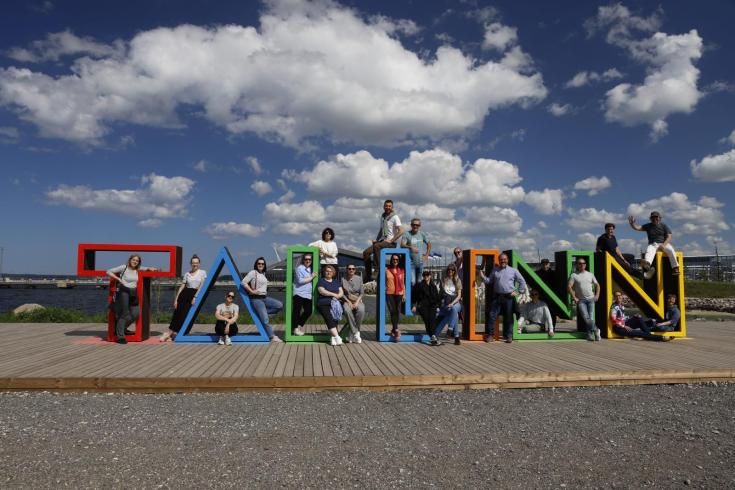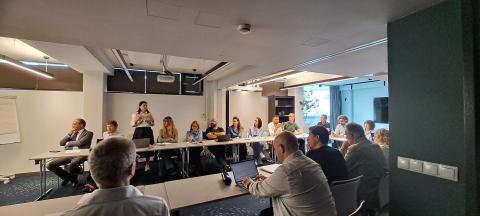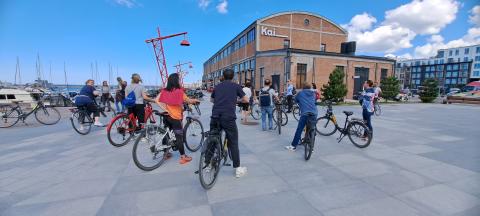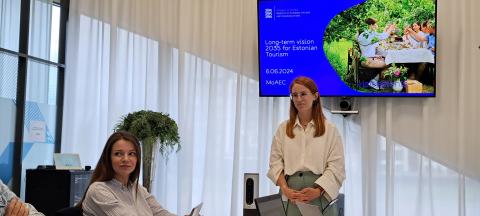3rd TIB Learning & Experience Session in Tallinn
Day 1
From June 3rd to 5th, Tallinn played host to the Interregional Learning & Experience Sessions. The event started with an insightful session on the Tourban project, which highlighted the Estonian Chamber of Commerce and Industry's significant role in supporting the sustainability transitions of tourism SMEs.
The opening day was rich with activities and presentations. Piret Betlem, General Manager of Kalev Spa Hotel & Water Park, welcomed attendees with an engaging speech. This was followed by a guided walking tour of Tallinn’s Old Town, led by Aliis Hazlehurst Palo from the Tallinn Guide Association and Visit Tallinn. The day continued at the Estonian Chamber of Commerce and Industry, where Hele Lõhmus from Visit Tallinn shared valuable insights and sustainable practices from Tallinn's tenure as the Green Capital. This session was followed by a World Café workshop, moderated by the lead partner, Tourism | Breda University of Applied Sciences. The workshop encouraged participants to reflect on their current practices, contemplate what to continue or stop, and identify needs for the upcoming semesters.
Imbi Lepik-Martinson from Visit Estonia then discussed the impact of certification schemes in promoting balanced tourism growth. Katri Tšeskidov from Harju County Entrepreneurship and Development Consultancy (HEAK) provided an informative presentation on sustainability and tourism distribution in areas near Tallinn. The day concluded with a workshop focused on local stakeholders' involvement, fostering mutual learning and exchange among participants.
Day 2
The second day began with presentations from project partners discussing their next steps in policy improvement. Helina Andruškevitšus from Visit Estonia captivated the audience with her talk on "Influencing Tourist Behaviour Through Gastronomy," emphasizing how local flavors and culinary experiences can help disperse tourists and stimulate economic growth. Esther Romero from the Public Enterprise for the Management of Tourism and Sport shared Andalucía's innovative approach to sustainable tourism, underscoring the importance of local community involvement and cultural heritage.
In the afternoon, participants embarked on a site inspection bicycle tour starting from the City Bike office. The tour focused on visitor dispersal issues in Tallinn and showcased alternative attractions such as Kalamaja, Noblessner, and the Seaplane Harbour. The day ended with a site inspection at Fotografiska, the Contemporary Museum of Photography, Art & Culture. Participants were treated to dinner at Fotografiska’s net-zero restaurant, renowned for its sustainable practices and awarded the Michelin Green Star.
Day 3
The final day in Tallinn was marked by a series of insightful discussions and presentations. Sandra Särav, Deputy Secretary General for Economics and Innovation at the Ministry of Economic Affairs and Communications of Estonia, kicked off the day with welcoming words. Aleksandr Michelson, a Tourism Adviser at the same ministry, shared valuable lessons on using strategic foresight to craft Estonia's long-term tourism vision for 2035. Tiziana Marinelli from Circolo Legambiente Appia Sud Il Riccio introduced the "Access-Ability" project for inclusive reception, while Alina Szasz from Brasov County discussed the Carpathian Convention.
An online presentation by Goof Lukken, MBA from Breda University of Applied Sciences, focused on acquiring and managing tourist attractions, providing remote participants with valuable insights. José Francisco Benitez from the Regional Ministry of Tourism outlined Andalucía's Territorial Plan for Sustainable Tourism, and Daniel Santana Verano from Sevilla City Office highlighted the Smart Tourism Office’s approach to managing diversity in neighborhoods.
The event concluded with a lunch at the rooftop café of the Museum and Visitor Centre of Fat Margaret (Eesti Meremuuseum / Estonian Maritime Museum), a UNESCO World Heritage site. This provided participants with breathtaking views of the historic Old Town and Tallinn Bay. A guided visit to the museum followed, wrapping up the sessions on a high note.
The Interregional Learning & Experience Sessions in Tallinn were a remarkable success, fostering rich discussions, knowledge exchange, and practical insights into sustainable tourism. Participants left with renewed inspiration and actionable strategies to promote balanced and inclusive tourism in their respective regions.



